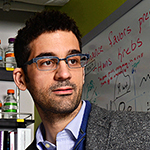 The Pew Charitable Trusts have named two early-career faculty members at Washington University in St. Louis among their Pew scholars in the biomedical sciences.
The Pew Charitable Trusts have named two early-career faculty members at Washington University in St. Louis among their Pew scholars in the biomedical sciences.
They are Qin Liu, PhD, assistant professor of anesthesiology and of ophthalmology and visual sciences at the School of Medicine; and Gary J. Patti, PhD, associate professor of chemistry in Arts & Sciences.
Pew scholars receive five-year, $240,000 grants to “provide a launching pad for the adventurous minds represented here, who will surely advance the field of biomedical science and create a healthier world for all of us,” Pew President Rebecca W. Rimel said in a statement on Pew’s website.
Scientists are nominated for pursing high-risk, high-reward research that can lead to extraordinary findings. Many Pew scholars go on to be recognized with other prestigious awards including the Nobel Prize, the Lasker Award and the Shaw Prize.
Liu’s work

Liu is a core faculty member of the School of Medicine’s Center for the Study of Itch. The center studies the underlying mechanisms of itch and translates findings into treatments for patients suffering from chronic itch.
Liu’s research probes the causes of eye irritation, specifically itchiness and pain. The two occur in different parts of the eye and are caused by two distinct processes. Pain comes from the cornea, which covers the iris and pupil, while itchiness emanates from the conjunctiva, the membrane covering the white of the eye.
In earlier research, Liu discovered a unique itch receptor in the conjunctiva and a pain channel in the cornea. She hopes to continue her research, clarifying how neurons detect itch-inducing stimuli and how itch signals are interpreted, to create better treatments for both of these forms of eye irritation.
Liu received the Helen B. Taussig Award in 2011, while a young investigator at Johns Hopkins University. She earned her bachelor’s degree from Wuhan University in 1998 and her PhD from the Chinese Academy of Sciences in 2004.
Patti’s work

Patti’s grant will support his work in the rapidly evolving field of metabolomics. Toward this effort, Patti is developing new mass spectrometry and nuclear magnetic resonance (NMR) technologies.
“The goal of metabolomics is to take a urine, blood or tissue sample, analyze it with an instrument called a mass spectrometer, and acquire a complete profile of all of the small molecules in the sample,” Patti said.
The profile might reveal whether the sample donor is ill, at risk of developing a disease, has been exposed to a toxin, or is unable to tolerate a drug therapy.
Patti said he investigates the molecules that cancer cells use to interact with neighboring cells and tissues. With the grant, he hopes to expand knowledge of tumor biology and hopefully open new avenues for therapy.
Patti also holds an appointment in medicine and is a member of the Division of Biology and Biomedical Sciences.
He received the 2015 Camille Dreyfus Teacher-Scholar Award for diverse contributions to metabolomics, and he won a Sloan Research Fellowship in 2014 for his groundbreaking work in the field.